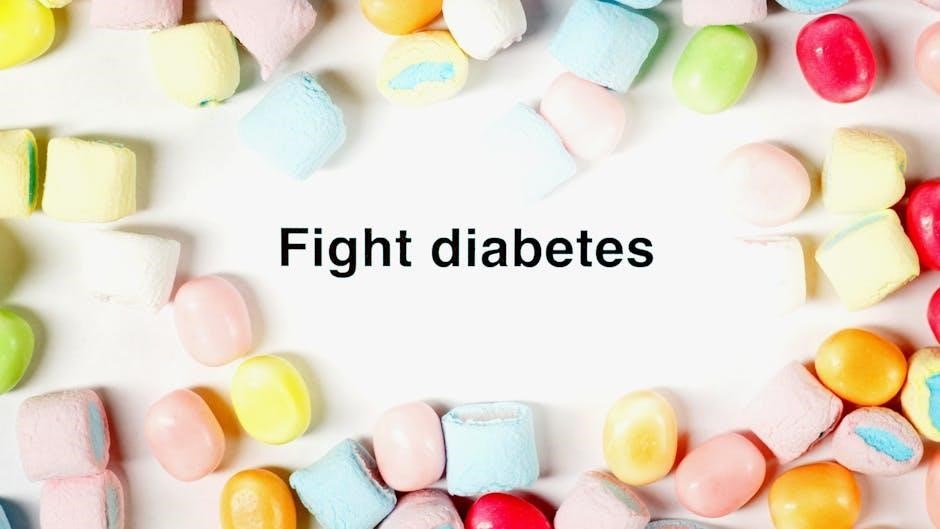The B Negative Blood Type Diet is a personalized eating plan tailored for individuals with B Negative blood type‚ focusing on specific food choices to optimize health and digestion.
It is based on the concept that blood type influences how the body processes food‚ with B Negative being rare‚ found in less than 2% of the population.
While the diet lacks robust scientific backing‚ many followers report improved digestion‚ weight management‚ and reduced chronic disease risks.
Adhering to a B Negative-specific diet involves avoiding certain foods and emphasizing others to align with the body’s natural biochemical profile.
Consulting a healthcare professional is recommended before starting this or any dietary regimen.
What is the B Negative Blood Type?
B Negative is one of the rarest blood types‚ found in less than 2% of the global population. It is characterized by the presence of B antigens on red blood cells and the absence of Rh factor‚ making it distinct from B Positive. This blood type plays a crucial role in the Blood Type Diet concept‚ which suggests that individuals with B Negative may benefit from a tailored diet to optimize health. The rarity of B Negative highlights the importance of understanding its unique characteristics and dietary needs. This section provides a foundational understanding of B Negative blood type‚ setting the stage for exploring its dietary recommendations.
Overview of the Blood Type Diet Concept
The blood type diet concept suggests that individuals should eat according to their blood type—A‚ B‚ AB‚ or O—to optimize health and digestion.
Proponents believe that lectins in foods react with blood type antigens‚ potentially causing inflammation or digestive issues if not aligned properly.
For B Negative blood type‚ the diet recommends specific foods that supposedly enhance metabolic efficiency and overall well-being.
While the concept has gained popularity‚ it remains controversial due to limited scientific validation.
Adherents often report improved digestion and reduced chronic disease risks‚ but it’s important to consult a healthcare professional before adopting this dietary approach.
Importance of a Personalized Diet for B Negative Blood Type
A personalized diet for B Negative blood type is crucial due to its rarity and unique biochemical profile.
Individuals with B Negative blood type‚ comprising less than 2% of the population‚ benefit from tailored food choices to enhance digestion and nutrient absorption.
A customized diet helps avoid foods that may trigger adverse reactions‚ such as lectins‚ which can interfere with B Negative blood cells.
By aligning meals with their blood type‚ B Negatives can improve energy levels and reduce the risk of chronic diseases like heart issues and diabetes.
While scientific evidence is limited‚ many adherents report positive health outcomes‚ making a personalized approach a valuable strategy for overall well-being.

Benefits of Following the B Negative Blood Type Diet
Following the B Negative Blood Type Diet can improve digestion‚ enhance energy levels‚ and support weight management.
It may also reduce the risk of chronic diseases‚ promoting overall well-being.
Many followers report better health outcomes when adhering to the diet.
Improved Digestion and Nutrient Absorption
The B Negative Blood Type Diet emphasizes food choices that align with the individual’s biochemical profile‚ potentially enhancing digestion and nutrient absorption. By avoiding certain foods that may contain incompatible lectins‚ which can disrupt digestion‚ and focusing on nutrient-rich foods‚ this diet aims to optimize gut health. While scientific evidence supporting this approach is limited‚ many adherents report improved digestive comfort and better nutrient uptake. The diet may also help reduce the risk of chronic diseases by promoting a balanced intake of essential vitamins and minerals. However‚ individual variability exists‚ and personal experimentation may be necessary to determine the most beneficial foods. Consulting a healthcare professional is recommended before making significant dietary changes.
Weight Management and Metabolism
The B Negative Blood Type Diet can support weight management by focusing on foods that align with the body’s natural biochemical profile.
By avoiding foods that may slow metabolism or cause weight gain‚ individuals can maintain a healthy weight more effectively.
The diet emphasizes lean proteins‚ vegetables‚ and beneficial fats‚ which help regulate metabolism and energy levels.
Eating foods that are metabolically friendly for B Negative blood type can reduce fat storage and improve overall metabolic efficiency.
This tailored approach ensures that the body processes nutrients optimally‚ promoting a balanced and sustainable weight management plan.
Combined with regular physical activity‚ the diet can enhance metabolic function and support long-term health goals.
Enhanced Energy Levels and Overall Health
Following the B Negative Blood Type Diet can lead to enhanced energy levels by aligning food choices with the body’s biochemical needs.
By focusing on beneficial foods‚ individuals may experience improved nutrient absorption and a balanced metabolism.
This can result in sustained energy levels throughout the day and reduced fatigue.
The diet also promotes overall health by minimizing inflammation and supporting immune function.
Many adherents report improved mental clarity and a reduced risk of chronic conditions‚ such as cardiovascular diseases and diabetes.
While individual results vary‚ the personalized approach of the B Negative Diet often contributes to a more vibrant and energetic lifestyle.
Consulting a healthcare professional is advised to tailor the diet to personal needs.
Reduction in Chronic Disease Risks
Adhering to the B Negative Blood Type Diet may help reduce the risk of chronic diseases‚ such as heart disease‚ diabetes‚ and certain inflammatory conditions.
By avoiding foods that can trigger adverse reactions in B Negative individuals‚ the diet aims to minimize inflammation and promote a balanced immune response.
Although scientific evidence supporting the blood type diet is limited‚ many followers report improved overall health and reduced susceptibility to long-term illnesses.
The diet’s emphasis on lean proteins‚ beneficial vegetables‚ and avoidance of harmful lectins aligns with general healthy eating principles.
Consulting a healthcare professional is essential to ensure the diet aligns with individual health needs and reduces chronic disease risks effectively.

Food Categories for the B Negative Blood Type Diet
The B Negative diet categorizes foods into beneficial‚ neutral‚ and avoid lists‚ helping maintain health and energy by aligning food choices with the blood type’s biochemistry.
Beneficial Foods for B Negative Blood Type
The B Negative Blood Type Diet emphasizes lean meats like turkey‚ chicken‚ and rabbit‚ which are easily digested and support overall health.
Fatty fish such as salmon and mackerel are also beneficial‚ providing essential omega-3 fatty acids.
Vegetables like spinach‚ broccoli‚ and sweet potatoes are highly recommended for their nutrient-dense properties.
Fruits such as berries‚ bananas‚ and grapes are ideal due to their natural sugars and antioxidants.
Whole grains like oatmeal‚ rice‚ and quinoa are encouraged for sustained energy.
Nuts and seeds‚ including almonds and pumpkin seeds‚ offer healthy fats and protein.
Herbs and spices like garlic‚ ginger‚ and turmeric add flavor while supporting immune function.
These foods align with the B Negative metabolism‚ promoting better digestion and energy levels.
Neutral Foods for B Negative Blood Type
Neutral foods for the B Negative blood type are those that neither significantly benefit nor harm the body; These foods can be consumed moderately‚ as they do not trigger adverse reactions. Examples include certain meats like rabbit or turkey‚ vegetables such as artichokes or beets‚ and grains like oats or barley. Fruits like bananas or pineapple may also fall into this category. Neutral foods help maintain balance in the diet without causing inflammation or digestive discomfort. Incorporating these foods allows individuals to enjoy variety while adhering to the B Negative diet’s guidelines. Moderation is key to avoiding potential imbalances.
Foods to Avoid for B Negative Blood Type
For individuals with B Negative blood type‚ certain foods can disrupt digestion and overall health.
Processed foods‚ gluten-containing grains‚ and some dairy products should be avoided due to potential sensitivities.
Corn‚ wheat‚ and soy are often problematic‚ as they may cause inflammation.
Certain meats‚ like pork and chicken‚ can be difficult to digest for B Negative individuals.
Additionally‚ avoid foods high in lectins‚ such as lentils and kidney beans‚ as they may interfere with nutrient absorption.
Refined sugars and artificial additives should also be minimized to support optimal health.
By eliminating these foods‚ individuals can better align their diet with their blood type and reduce the risk of chronic conditions.
Always consult a healthcare professional before making significant dietary changes.

Detailed Food List for B Negative Blood Type
A B Negative diet focuses on beneficial‚ neutral‚ and avoidable foods. Beneficial foods enhance health‚ while avoidable ones may cause inflammation or digestion issues;
Consult a healthcare professional before starting this diet to ensure it aligns with your needs and preferences.
Meat and Poultry Recommendations
For individuals with B Negative blood type‚ certain meats and poultry are highly beneficial‚ while others should be avoided. Lamb‚ venison‚ and beef are excellent choices‚ as they align with the body’s digestive needs.
Chicken and pork‚ however‚ are not recommended‚ as they may trigger inflammation or digestive discomfort due to specific lectins.
Organ meats like liver can be consumed in moderation but should not dominate the diet.
It is also advised to opt for leaner cuts of meat to support overall health and weight management.
By focusing on the recommended meats‚ B Negative individuals can enhance nutrient absorption and reduce the risk of chronic conditions.
Balancing meat intake with other food groups ensures a well-rounded diet.
Fish and Seafood Options
Fish and seafood play a significant role in the B Negative Blood Type Diet‚ offering essential nutrients and protein.
Beneficial options include cod‚ salmon‚ halibut‚ and trout‚ which are rich in omega-3 fatty acids and support heart health.
Shellfish like mussels and clams are also recommended for their mineral content.
However‚ certain fish such as shrimp and lobster should be avoided‚ as they may hinder metabolism.
Seafood provides lean protein and supports immune function‚ making it a valuable component of the diet.
Always opt for fresh‚ wild-caught varieties to maximize nutritional benefits;
Portion control is key to maintaining a balanced and healthy dietary regimen.
Eggs and Dairy Products
Eggs and dairy products play a moderate role in the B Negative Blood Type Diet‚ with some options being more beneficial than others.
Eggs are generally well-tolerated and provide essential nutrients like protein and vitamins.
Dairy choices should focus on products like goat’s milk‚ yogurt‚ and cheeses such as feta or ricotta‚ which are easier to digest for B Negative individuals.
Avoiding excessive consumption of cow’s milk and high-fat dairy is recommended‚ as they may cause inflammation or digestive discomfort.
Portion control and individual tolerance should guide dairy intake‚ ensuring it aligns with overall health goals.
Vegetables: Best Choices
For individuals with B Negative blood type‚ incorporating the right vegetables is crucial for optimal health. Spinach‚ broccoli‚ and sweet potatoes are excellent choices due to their high nutrient content and ease of digestion. Leafy greens like kale and Swiss chard are also recommended for their rich antioxidant properties. Green beans and other fiber-rich vegetables support healthy digestion and overall well-being. These vegetables are typically easy to digest and provide essential vitamins and minerals that align with the dietary needs of B Negative individuals‚ promoting a balanced and nutritious diet.
Fruits: Ideal Selections
For individuals with B Negative blood type‚ certain fruits are highly beneficial‚ while others should be consumed in moderation or avoided.
Berries such as strawberries‚ blueberries‚ and raspberries are excellent choices‚ as they are rich in antioxidants and align well with the B Negative profile.
Apples‚ pears‚ and bananas are also ideal‚ providing essential vitamins and minerals without causing digestive discomfort.
Figs‚ grapes‚ and pineapple can be included in moderation‚ but it’s important to avoid citrus fruits like oranges and lemons‚ as they may disrupt the body’s natural balance.
Incorporating these fruits into meals and snacks can enhance energy levels and support overall well-being for B Negative individuals.
Grains: Suitable Options
For individuals with B Negative blood type‚ certain grains are more beneficial than others. Oats‚ quinoa‚ and brown rice are excellent choices‚ as they are easily digestible and provide sustained energy.
Barley and rye should be consumed in moderation‚ while wheat and corn are often recommended to avoid due to potential digestive discomfort.
Millet and buckwheat are also suitable options‚ offering nutritional value without triggering adverse reactions.
Whole grains are generally preferred over refined ones to maximize nutrient intake and support overall health.
Incorporating these grains into meals can help maintain a balanced diet and promote well-being for B Negative individuals.
Legumes and Pulses: What to Include
For individuals with B Negative blood type‚ certain legumes and pulses are recommended to support digestion and overall health.
Beneficial options include lentils‚ chickpeas‚ and black beans‚ which are rich in protein and fiber‚ making them ideal for balanced meals.
These legumes are easy to digest and align with the B Negative metabolic profile. However‚ some legumes‚ such as kidney beans and lima beans‚ should be avoided as they may cause digestive discomfort.
It’s important to prepare legumes properly by soaking and cooking them thoroughly to enhance nutrient absorption. Incorporating these foods can provide sustained energy and support immune function. Always refer to a detailed food list for specific guidance.
Nuts and Seeds: Healthy Choices
Nuts and seeds play a vital role in the B Negative Blood Type Diet‚ offering essential nutrients and healthy fats.
Almonds‚ walnuts‚ and pumpkin seeds are highly recommended due to their compatibility with B Negative blood type.
These options provide antioxidants‚ fiber‚ and energy-boosting properties.
Additionally‚ flaxseeds and sunflower seeds are beneficial for their omega-3 and vitamin E content.
However‚ it’s important to avoid peanuts and cashews‚ as they may cause adverse reactions.
Portion control is key‚ as overconsumption can lead to weight gain.
Soaking or roasting nuts and seeds can enhance digestibility.
Incorporating these into meals or snacks supports overall health and aligns with the diet’s principles.
Always choose unsalted and unsweetened varieties to maximize benefits.
Herbs and Spices for Flavor and Health
For individuals with B Negative blood type‚ incorporating specific herbs and spices can enhance flavor and support overall health.
Ginger‚ known for its digestive benefits‚ is highly recommended‚ while turmeric aids in reducing inflammation.
Parsley‚ rich in antioxidants‚ supports immune function‚ and dill can help regulate blood sugar levels.
Cumin and coriander are excellent for improving digestion and metabolism.
These herbs and spices not only add variety to meals but also align with the dietary needs of B Negative individuals.
Using them in moderation ensures a balanced and nutritious diet tailored to your blood type.
Consulting a healthcare professional or a detailed food list PDF can provide further guidance on optimal choices.

Lifestyle Tips for B Negative Blood Type
Maintaining a healthy lifestyle for B Negative blood type involves staying hydrated‚ engaging in regular physical activity‚ and managing stress effectively.
Prioritizing sleep‚ mental well-being‚ and overall balance is crucial.
Exercise and Physical Activity Recommendations
For individuals with B Negative blood type‚ a balanced exercise routine is crucial to maintain overall health and energy levels;
Engaging in moderate-intensity activities like brisk walking‚ cycling‚ or swimming is highly recommended.
Strength training and flexibility exercises‚ such as yoga or Pilates‚ can also be beneficial when done in moderation.
It’s important to avoid overexertion‚ as B Negative individuals may be more prone to stress-related fatigue.
Mixing physical activity with mental relaxation techniques‚ like meditation‚ can help achieve a holistic well-being.
While the blood type diet theory remains controversial‚ incorporating regular exercise aligns with its principles of optimizing health.
Always consult a healthcare professional before starting any new fitness regimen.
Hydration and Fluid Intake Guidelines
Proper hydration is essential for B Negative blood type individuals to support digestion and nutrient absorption. Aim for at least 8-10 glasses of water daily‚ incorporating herbal teas and mineral-rich beverages.
Avoid sugary drinks and alcohol‚ as they can disrupt blood type-specific balance. Drink water before meals to aid digestion and prevent overeating.
Include water-rich foods like cucumbers and melons to enhance hydration levels naturally. Staying hydrated helps maintain energy levels and overall health.
Consult a healthcare professional to tailor fluid intake to individual needs and health conditions for optimal results.
Stress Management Techniques
Effective stress management is crucial for individuals following the B Negative Blood Type Diet‚ as stress can disrupt digestion and overall well-being. Techniques like meditation‚ yoga‚ and deep breathing exercises can help maintain emotional balance. Regular physical activity‚ such as walking or swimming‚ is also recommended to reduce stress naturally. Additionally‚ mindfulness practices and adequate sleep are essential for regulating stress hormones. Incorporating relaxation routines into daily life can enhance the benefits of the diet‚ promoting better energy levels and mental clarity. By combining a tailored diet with stress-reducing activities‚ individuals can achieve a holistic approach to health and wellness.

Meal Planning Strategies
Plan meals around beneficial foods like lean meats‚ fish‚ and vegetables‚ avoiding harmful choices.
Use a B Negative Blood Type Diet food list PDF for guidance.
Balance meals to maintain energy and digestive health‚ ensuring variety and nutrient-rich options.
Consult a healthcare professional for personalized advice.
Breakfast Ideas for B Negative Blood Type
For B Negative individuals‚ breakfast should focus on lean proteins‚ beneficial grains‚ and fresh fruits.
Consider starting with an omelette made with eggs‚ spinach‚ and mushrooms‚ paired with a slice of whole-grain toast.
Oatmeal with almond butter and a sprinkle of berries is another nutritious option.
Smoothies blending bananas‚ berries‚ and almond milk can provide a quick and energizing start.
Opt for fresh fruit like apples or pears as a light alternative.
Portion control and balance are key to maintaining energy levels and digestive health.
Avoid foods that may cause inflammation or sluggishness‚ such as processed meats or excessive dairy.
Always consult a healthcare professional before making significant dietary changes.
Lunch and Dinner Recipes
For B Negative blood type‚ lunch and dinner recipes should focus on beneficial foods like lean meats‚ fish‚ and vegetables.
A grilled chicken salad with mixed greens‚ cucumbers‚ and olive oil is a great option.
Turkey or venison stir-fries with zucchini‚ carrots‚ and garlic are also ideal.
Fish like cod or salmon can be baked with lemon and herbs for a healthy dinner.
Vegetable-based dishes‚ such as roasted sweet potatoes or green beans‚ complement these meals well.
Ensure all ingredients align with the B Negative diet list to maximize benefits.
These recipes promote balanced nutrition and support overall well-being for individuals with this blood type.
Snacking Options That Align with the Diet
Snacking on the B Negative Blood Type Diet involves choosing foods that promote energy balance and digestion.
Opt for nuts like almonds‚ walnuts‚ and pumpkin seeds‚ which are beneficial for this blood type.
Fresh fruits such as berries‚ apples‚ and bananas are also excellent choices.
Vegetables like carrots‚ cucumbers‚ and celery make great crunchy snacks.
Avoid foods like corn‚ wheat‚ and tomatoes‚ as they are harmful for B Negative individuals.
Herbs and spices like ginger‚ turmeric‚ and parsley can add flavor to snacks without compromising the diet.
Stay hydrated with water or herbal teas‚ and practice portion control to maintain overall health and vitality.
Scientific Debate and Criticisms
The blood type diet‚ including the B Negative plan‚ lacks rigorous scientific evidence to support its claims. Critics argue that its effectiveness has not been proven conclusively.
Some studies suggest that the diet may benefit certain individuals‚ but others question its universal applicability. The rarity of B Negative blood type further complicates research.
While anecdotal reports exist‚ broader scientific validation remains limited‚ leading to skepticism within the medical community.
Criticisms of the Blood Type Diet
The Blood Type Diet‚ including recommendations for B Negative blood type‚ has faced criticism for lacking rigorous scientific evidence to support its claims.
Many experts argue that the diet is overly simplistic and does not account for individual variability in genetics‚ metabolism‚ or lifestyle.
The idea that blood type alone determines dietary needs is not universally accepted‚ and some view it as a fad diet.
Additionally‚ the restrictive nature of the diet may lead to nutrient deficiencies if not carefully planned.
Critics also point out that the benefits reported by followers could be due to placebo effects or general healthy eating habits rather than blood type specificity.
Overall‚ while some find it beneficial‚ the diet remains controversial within the scientific community.
Scientific Evidence Supporting the Diet
While the B Negative Blood Type Diet lacks robust scientific validation‚ some studies suggest that aligning diet with blood type may improve health outcomes.
Research indicates that individuals with B Negative blood type may experience better digestion and reduced inflammation when adhering to the diet.
Proponents argue that the diet’s focus on avoiding lectins‚ which can interfere with blood type compatibility‚ may reduce chronic disease risks.
However‚ critics emphasize the need for more rigorous‚ peer-reviewed studies to confirm these benefits.
Despite the debate‚ many followers report positive results‚ making the diet a popular choice for those seeking personalized nutrition.
Further scientific investigation is necessary to fully understand its efficacy.
The B Negative Blood Type Diet offers a personalized approach to improving health through tailored food choices. While not scientifically proven‚ many find it beneficial for digestion‚ energy‚ and weight management. Consulting a healthcare professional before starting is essential for personalized guidance and safety.
The B Negative Blood Type Diet focuses on tailoring food choices to match the unique biochemical profile of individuals with B Negative blood type.
It emphasizes selecting beneficial foods‚ avoiding harmful ones‚ and maintaining a balanced diet to improve digestion‚ energy‚ and overall health.
While the diet lacks robust scientific evidence‚ many adherents report positive outcomes such as weight management and reduced disease risks.
Consulting a healthcare professional is essential before adopting this diet.
By following the B Negative food list‚ individuals can align their eating habits with their blood type‚ potentially enhancing their well-being and quality of life.
Encouragement to Consult a Healthcare Professional
Before adopting the B Negative Blood Type Diet‚ it is crucial to consult a healthcare professional to ensure it aligns with your unique health needs.
While the diet may offer benefits like improved digestion and energy‚ individual results vary‚ and scientific evidence is limited;
A professional can help tailor the diet to your lifestyle‚ ensuring it is nutritionally balanced and safe.
They can also address potential interactions with medications or health conditions‚ providing personalized guidance.
Seeking expert advice ensures you make informed decisions about your health and diet‚ maximizing benefits while minimizing risks.
Additional Resources
Download the B Negative Blood Type Diet food list PDF from official health websites or purchase books by experts like Dr. Peter D’Adamo for comprehensive guides.
Consult a healthcare professional before starting any new diet plan.
Where to Find the B Negative Blood Type Diet Food List PDF
The B Negative Blood Type Diet food list PDF can be easily found online through various health and wellness websites‚ eBooks‚ and dietary resources.
Many official websites dedicated to blood type diets offer downloadable PDF guides tailored to B Negative individuals.
Online marketplaces like Amazon and Google Books often feature comprehensive food lists in eBook formats.
Additionally‚ health portals and forums focused on blood type diets provide free or purchasable PDF resources.
Always ensure the source is reputable to maintain accuracy and safety.
Consulting these resources can help you create a personalized and effective meal plan.
Recommended Books and Websites
For those exploring the B Negative Blood Type Diet‚ several books and websites offer valuable insights and practical guidance.
Books like “Eat Right 4 Your Type” by Dr. Peter D’Adamo provide foundational knowledge on blood type diets.
Websites such as BloodTypeDiet.com and DAdamo.com provide detailed food lists‚ meal plans‚ and scientific explanations.
Additionally‚ online communities and forums dedicated to blood type diets can connect you with others sharing tips and experiences.
Always verify the credibility of sources and consult a healthcare professional before making significant dietary changes.